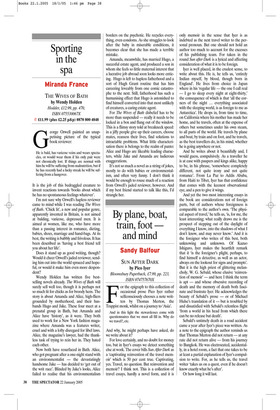By plane, boat, train, foot — and mind
Sandy Balfour
SUN AFTER DARK by Pico Iyer Bloomsbury Paperback, £7.99, pp. 223, ISBN 074757670X For the epigraph to this collection of occasional prose Pico Iyer rather selfconsciously chooses a note written by Thomas Merton, the Trappist monk, whilst on a journey to ‘Asia’.
And in this light the stewardesses come with questionnaires that we must all fill in. Why do we travel?, etc.
And why, he might perhaps have asked, do we write about it?
For love certainly, and no doubt for money too, but in Iyer’s essays we detect something else at work. The cover bills Sun After Dark as a ‘captivating reinvention of the travel memoir’ which is 50 per cent true. Captivating, yes. Travel, no question. But reinvention and memoir? I think not. This is a collection of travel essays, hardly a novel form, and it is only memoir in the sense that Iyer is as indebted as the next travel writer to the personal pronoun. But one should not hold an author too much to account for the excesses of his publishing team. For taken in the round Sun after Dark is a lyrical and affecting consideration of what it is to be foreign.
Iyer is well placed, in the crudest sense, to write about this. He is, he tells us, ‘entirely Indian myself, by blood, though born in England’. He lives from choice in Japan where in his ‘regular life — the one I call real — I go to sleep every night at eight-thirty,’ the consequence of which is that ‘all the corners of the night ... everything associated with the sleeping world, is as foreign to me as Antarctica’. He drops in, from time to time, on California where his mother has made her home, and he travels, often at the expense of others but sometimes under his own steam, to all parts of the world. He travels by plane and boat, by train and on foot, and he travels, as the best travellers do, in his mind, whether he is going anywhere or not.
And he writes about it beautifully and, I would guess, compulsively. As a traveller he is at ease with paupers and kings alike, happy to be, in his phrase, ‘somewhere completely different, not quite irony and not quite romance’. From La Paz to Addis Ababa, from Haiti to Tibet, Iyer has that confidence that comes with the keenest observational eye, and a pen to give it wings.
And yet the two most interesting essays in the book are considerations not of foreign parts, but of authors whose foreignness is comparable to the author’s own. ‘The physical aspect of travel,’ he tells us, ‘is, for me, the least interesting; what really draws me is the prospect of stepping out of the daylight of everything I know, into the shadows of what I don’t know, and may never know.’ And it is the foreigner who writes of this best, both unknowing and unknown. Of Kazuo Ishiguro, Iyer makes the heartfelt remark that it ‘is the foreigner’s plight, perhaps, to find himself a detective, as well as an actor, always on the lookout for signs and prompts’. But it is the high priest of glittering melancholy, W. G. Sebald, whose elusive ‘reinvention of memoir’ — and here I think the term is apt — and whose obsessive recording of death and the memory of death both fascinate and frustrate Iyer. He acknowledges the beauty of Sebald’s prose — or of Michael Hulse’s translation of it — but is troubled by and dissatisfied with Sebald’s relentless flight ‘from a world in his head from which there can be no release but death’.
Sebald’s untimely death in a road accident came a year after Iyer’s piece was written. As a note to the epigraph the author reminds us that Thomas Merton did not return — at any rate did not return alive — from his journey to Bangkok. He was electrocuted, accidentally, in a hotel room, a fact that one takes to be at least a partial explanation of Iyer’s compulsion to write. For, as he tells us, the travel writer ‘takes us on a quest, even if he doesn’t know exactly what he’s after’.
Or how long it will last.













































 Previous page
Previous page